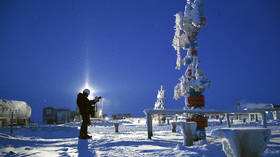
Washington previously vowed to halve Moscow’s energy revenues by 2030

Oleg Deripaska (left), co-founder of En+ and Rusal © Sputnik / Ramil Sitdikov
Moscow should take the US threat to halve Russia’s energy revenues seriously, billionaire Oleg Deripaska said on Saturday. To make his point the businessman cited last year’s sabotage of the Nord Stream pipelines and a recent train derailment in Siberia.
The Russian aluminum magnate urged the government to focus on transport networks and port infrastructure in the country’s Far East, and the development of the North-South Transport Corridor in the Caspian region.
“Threats of blocking the Danish straits and the Bosporus have already been voiced,” Deripaska wrote on his Telegram channel.
“Russia is wholly up to the task of creating alternative routes via the Baltic and Turkish directions over four years,” he said, adding that the plan’s implementation should be monitored on a daily basis.
Earlier this week, a senior US official told the Financial Times that Washington would pursue its sanctions on Russian energy “for years to come” with the goal of halving Moscow’s oil and gas revenues by 2030.
On Wednesday, a freight train caught fire as it passed through the Bessolov Severomuysky tunnel, the longest in Russia, located in Buryatia. The incident was caused by an unidentified explosive device, Russian business daily RBK reported on Friday citing a local police source.

Russia’s Investigative Committee earlier opened an investigation into a similar incident, in which 19 freight cars carrying mineral fertilizers derailed on November 11 in Ryazan Region, around 200km southeast of Moscow. Later, the case was reclassified as a “terrorist act.” Earlier this week, law enforcement agencies reported the arrest of a man in relation to the attack, saying it had been carried out on behalf of Ukraine.
Several Western media outlets previously reported, citing an unnamed Ukrainian source, that operatives working for the Security Service of Ukraine (SBU) had detonated explosives in the rail tunnel in Siberia, targeting the route due to its alleged use for transporting military supplies.
In September 2022, the Nord Stream 1 and 2 gas pipelines, connecting Russia and Germany under the Baltic Sea, were sabotaged by explosions. Berlin has yet to identify the perpetrators of the attack, which Moscow claimed was orchestrated by US intelligence agencies. Meanwhile, several Western media outlets have suggested that the pipelines were blown up by Ukraine-linked saboteurs.
For more stories on economy & finance visit RT’s business section




